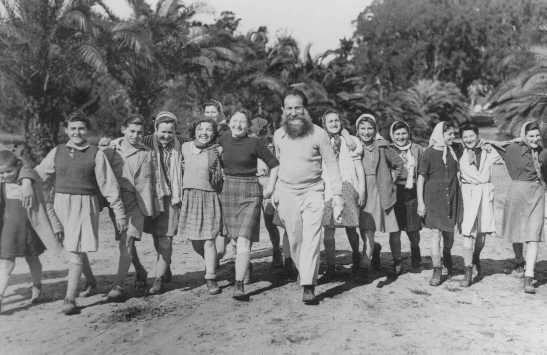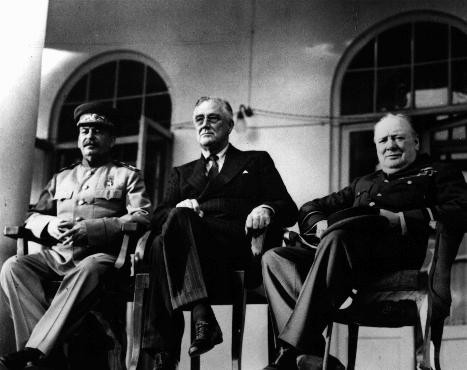
Iran during World War II
Background
During and immediately following World War I, British and Russian (later Soviet) troops occupied large pieces of once independent Persia, now known as Iran, despite the country’s declared neutrality.
A military officer serving in the Persian Cossack Brigade and an ardent Persian nationalist, Reza Khan led a military conspiracy aimed at the reestablishment of Iran’s sovereignty under a strong central government. Backed by the British, Reza Khan led a coup d’etat in February 1921, seizing control over Tehran and forcing the weak and corrupt Qajar Shah to appoint journalist Sayyid Zia al-Din Tabatabai as Prime Minister, and himself—Reza Khan—as Minister of War. After he had suppressed several rebellions and established a semblance of centralized control in the country, the Persian national assembly appointed Reza Khan as Prime Minister in 1923 with virtual dictatorial power.
After crushing an Arab nationalist rebellion and with British backing, Reza Khan induced the assembly to depose the Qajar Shah and appoint himself Shah on December 13, 1925. Reza took the name Pahlavi in establishing his new dynasty. The assembly also recognized his eldest son, Muhammad-Reza, as heir to the throne. During his reign, Reza Shah implemented reforms to rebuild the country and to restore political and economic independence. He strove for a modern country with a strong military, united as one instead of divided by multiple religious and tribal groups, and for leadership free from foreign influence. The character of his rule has been controversial: on the one hand he has been perceived as a factor in the modernization of Iran; on the other, his frequent resort to brutal force and his dependence on ethnic favoritism to secure the Pahlavi Dynasty effectively inhibited the development of modern democracy or pluralist government in Iran.
In 1935, the Persian government changed the name of the country from “Persia” to “Iran,” the historical name of the country and a designation in common internal use for centuries. The new designation at the same time distracted attention from the traditional Western designation “Persia” (a term Greek in origin). “Persian” was the historical name of one of the ethnic groups in Iran. With the reforms Reza Shah was implementing, the adoption of a new name for the country was seen as restoring Iran’s historical legacy. While Persia had fallen victim to imperialism, Iran would be free from foreign control.
Iran after the outbreak of World War II
Adolf Hitler, the leader of the Nazi Party, had written about the alleged racial inferiority of non-Europeans, especially Arabs and Indians, in Mein Kampf, published in 1925. Hitler had also been contemptuous of anti-colonial movements, referring to them as a “coalition of cripples” that could never be true partners for the Germans. After the Nazis came to power in 1933, and particularly after the Nazi leadership unleashed World War II by invading Poland in 1939, German soldiers and diplomats, hoping to undermine the strength of the British and French colonial empires, actively sought to influence strategic and economic developments in Iran, India, and the Arab Middle East. Consequently they downplayed racist references to non-Jewish peoples in the Middle East in public discourse. Included in the aims of the 1942 Nazi German summer offensive in the Soviet Union were German occupation of the Caucasus region, and from there invasion of Iraq and Iran in the hopes of severing Great Britain’s transit routes to British India and to the Soviet interior.
Despite Nazi German attitudes on the racial inferiority of the inhabitants of the Middle East, Reza Shah leaned in sympathy towards Germany, since, unlike Great Britain or the Soviet Union, Germany did not have a past record of interfering in internal Iranian affairs or occupying Iranian territory. Reza Shah intended to learn about political management and industrial technology from Germany. He also wanted to decrease trade with the Soviet Union. By 1940–1941, nearly half of all Iranian imports came from Germany; 42% of all Iranian exports went there.
The Persian department of Nazi Germany’s propaganda radio service, Radio Zeesen, aired programs drawing on Islamic religious themes, since Nazi race-based antisemitism and nationalism did not resonate with Iranian audiences. Among the themes of German propaganda was the notion that Hitler was the Shiite Messiah, or Twelfth Imam, who had returned to destroy the Jews and communists. Hitler’s struggle was compared to the struggle of the Prophet Mohammed against the Jews, drawing parallels between chapters from the Quran about Prophet Mohammed’s clashes with Jewish tribes in Arabia to Shi’ite Iranian hostilities toward Great Britain and the Soviet Union. Such efforts to engage the Shi’ia population prompted concerns on the part of the newly crowned Muhammad Reza Pahlavi, because he perceived his more secular-oriented regime was being undermined and objected to Hitler being labeled a Messiah.
Iranian Jews ruled by Reza Shah and later his son, Muhammad Reza Pahlavi, enjoyed many rights and freedoms that they had not previously experienced, including relative cultural and religious autonomy, increased economic opportunities, and significant political rights. Jews also benefitted from the Pahlavi tilt towards a more secular domestic policy. The Iranian government informed the Germans that it considered Iranian Jews to be fully assimilated Iranians. Many Polish Jews among the 116,000 Polish refugees permitted in 1942 to leave the Soviet interior to which they had fled in 1941 or been deported in 1939–1940 passed safely through Iran on the way to Palestine or Great Britain, where many of the Polish refugees, including the Jews among them, joined British military units. The Iranian government also permitted the leaders of the pro-Axis Iraqi government fleeing after British troops deposed it in late May 1941, including the former Prime Minister Rashid al-Kilani and the Palestinian leader Amin al-Husayni, to escape through Iran to Italy.
Reza Shah declared Iran neutral at the start of World War II. He feared both Soviet and British ambitions in his country and despite the benefits of economic relations with Germany, he considered Germany to be too committed to its program of race-based expansion and ideology. Neither side had Iran’s best interests in mind. In the wake of dramatic German victories against the Soviet Union in the summer of 1941, both the British and Soviet governments occupied southern and northern Iran respectively, using Reza Shah’s refusal to expel German nationals as an excuse, but in fact out of concern that a successful German drive into the Caucasus would not stop at the Iranian border and that continued Iranian neutrality would inhibit the transit of supplies from British India to Egypt and British supply routes to the Soviet Union. Allied intentions in Iran were also to protect British-controlled oil fields, to direct military supplies to the Soviet Union using the Trans-Iranian Railroad (the major railway linking Tehran with the Persian Gulf and Caspian Sea), and to put a stop to German intelligence operations in Iran.
On September 11, 1941, British Envoy Sir Reader S. Bullard met with Iran’s Prime Minister, Mohammad-Ali Furuqi, to demand the immediate removal of Reza Shah in favor of his son, Muhammad Reza Pahlavi, who was known to be pro-British. Five days later, on September 16, Reza Shah abdicated and went into exile, leaving his son as Shah. Reza Shah died in Johannesburg, South Africa, on July 26, 1944.
In January 1942, Iran, the Soviet Union, and Great Britain signed a Tripartite Treaty of Alliance. In this agreement, the Allies recognized Iranian territorial integrity, sovereignty, and political independence. They also pledged to protect the Iranian economy from the effects of the war. Most importantly, they promised to withdraw from Iranian territory within six months of the end of the war. By the spring of 1942, Iran had cut off all relations with the Axis Powers and had expelled all of their nationals residing in Iran.

On September 9, 1943, Iran declared war on Germany. Shortly after, between November 28 and December 1, 1943, the leaders of the Big Three met in Tehran. US President Franklin Roosevelt, British Prime Minister Winston Churchill, and Soviet Communist Party General Secretary Josef Stalin attended, discussing military strategies against Germany and Japan and the post–World War II era. They also signed the “Declaration of the Three Powers Regarding Iran,” an agreement providing economic assistance to Iran during and after the war. The Allied governments also stated that they all shared a “desire for the maintenance of the independence, sovereignty, and territorial integrity of Iran.” British and US troops withdrew from Iran in January 1946. The Soviets withdrew in May 1946 only after the United Nations applied pressure.
Impact of World War II
The impact of World War II on Iran was devastating. Iranian neutrality was ignored and the country lost its de facto independence to occupying forces. The British and Soviet authorities dominated the use of major roadways and the Trans-Iranian Railroad for their own purposes, and sequestered and deployed Iranian manpower and equipment for the war effort. With few resources left for farming, combined with a bad harvest in 1942 and an enormous influx of European refugees, famine spread and many people died. Instability within the political and social arenas grew and the economy suffered.
Critical Thinking Questions
How and why did Iran’s relationship with Germany change from 1933–45?
What factors drove the Allies’ interest in partnering with or controlling Iran at this time? How did these factors relate to the course of the war and to the Holocaust?

